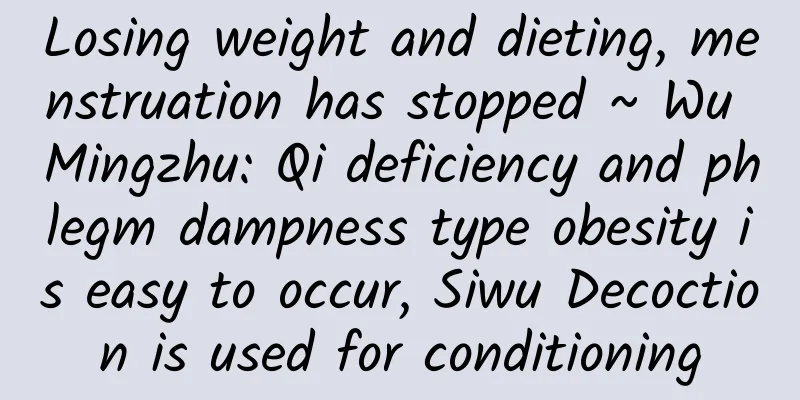Losing weight and dieting, menstruation has stopped ~ Wu Mingzhu: Qi deficiency and phlegm dampness type obesity is easy to occur, Siwu Decoction is used for conditioning

|
In order to lose weight, people will try every possible means, especially the extreme method of "letting go", which is dieting. There are also many people who found after trying for a few months that they could not lose weight, but their complexion became haggard and sallow, and even their menstruation stopped coming... Chinese medicine practitioners say that overly drastic weight loss methods may cause endocrine disorders, affect kidney qi, and easily lead to weight gain, resulting in "Qi deficiency and phlegm-dampness type obesity." Traditional Chinese medicine conditioning must replenish qi and blood. Three soup recipes are recommended, including Siwu Decoction and Shengmai Yin. A 19-year-old female student named Guo, who was 160cm tall and weighed 70kg, was often mocked by male classmates for having "elephant legs", so she started dieting to lose weight. She only drank water and ate a small amount of biscuits all day, and lost 8kg in 2 months. However, she found that she could no longer lose weight after the third month. She became tired, her face looked haggard and sallow. What was even worse was that her menstruation was late. Traditional Chinese Medicine: Long-term dieting can cause endocrine disorders and affect kidney function In her new book, "The Phlegm-Removing and Dampness-Loss Weight Method," Chinese medicine practitioner Wu Mingzhu states that although weight will be lost in the early stages of dieting, it is also easy to gain weight again. This will cause the body's nutrition to be in an extremely unbalanced state for a long time, which is very harmful to the body and can also cause endocrine disorders and affect kidney function. Ms. Guo in this case was brought to the doctor by her mother. After the consultation, it was discovered that she was deliberately dieting. Although she lost weight quickly at the beginning due to not eating, she was actually just losing water and muscle, and the fat still remained in her body. Traditional Chinese medicine believes that the kidneys are related to the reproductive and urinary systems, the endocrine system, and the immune system. Deliberately dieting and not eating will cause damage to the internal organs, and may even lead to insufficient kidney qi and deficiency of both qi and blood, leading to anemia, palpitations, haggard face, dry skin, fatigue, decreased concentration, anorexia and other diseases! Deliberate dieting can cause Qi deficiency and phlegm dampness type obesity, which can cause organ function decline and "Qi and blood deficiency" Chinese medicine practitioner Wu Mingzhu said that obesity caused by deliberate dieting can cause the organs to function poorly and lead to "deficiency of both qi and blood". The inability of qi to produce blood can lead to loss of both "qi" and "blood", which in turn affects the functions of the spleen, stomach, kidneys, and liver. The spleen and stomach are the source of Qi and blood. Blood is produced through the spleen and stomach. Blood deficiency will lead to blocked meridians and even blood stasis. The kidneys are the source of immunity and vitality. Insufficient kidney Qi will cause the endocrine system to be out of balance, resulting in the body's phlegm and dampness, and lower body obesity will be more serious. The liver stores blood, regulates the flow of qi, and helps the spleen and stomach to transport and transform qi. Insufficient liver blood can cause imbalance of qi and blood, and even qi stagnation, blood stasis, and metabolic disorders, leading to phlegm-dampness and obesity. Deficiency of both Qi and blood refers to the occurrence of both Qi deficiency and blood deficiency. You need to replenish Qi and blood, otherwise it will easily cause various diseases, and you will not only fail to lose weight but also lose your health! It is recommended to change the bad habit of picky eating, consume a variety of nutritionally balanced fruits and vegetables, ingredients that strengthen the spleen and kidneys, and exercise to regulate qi and blood, and dredge the meridians. Once the qi and blood circulation function returns to normal, the phlegm-damp constitution can be driven away. Treatment principles for Qi deficiency and phlegm dampness type obesity: Strengthen the spleen and stomach, nourish the kidney and liver, and replenish qi and blood Regarding the problem of "qi deficiency and phlegm dampness type obesity", Chinese medicine doctor Wu Mingzhu recommends the following methods: Conditioning suggestions: Strengthen the spleen and stomach, nourish the kidneys and liver, and replenish qi and blood. ** Ingredients: red dates, hawthorn, spinach, carrots, black fungus, black sesame, pork liver, four gentlemen Decoction, Siwu Decoction, Shengmai Drink. 【Sijunzi Decoction】: Ingredients: 15 grams of ginseng, 10 grams of Atractylodes macrocephala, 10 grams of Poria cocos, and 5 grams of roasted licorice. Method: Boil in hot water and drink while warm. 【Siwu Decoction】: Ingredients: 9 grams each of white peony root, angelica root, rehmannia root and chuanxiong. Method: Boil in hot water and drink while warm. 【Shengmai Drink】: Ingredients: 3 qian each of ginseng and Ophiopogon japonicus, 1.5 qian of Schisandra chinensis. Method: Boil in hot water and drink while warm. |
Recommend
Treatment of incomplete uterine aspiration after artificial abortion
Artificial abortion is a last resort remedial mea...
Will frequent constipation lead to colon cancer? Must-eat cabbage: 3 types of good anti-cancer foods
Colorectal cancer has topped the list of the top ...
What are the causes of irregular menstruation?
The most common situation during menstruation is ...
Experts tell you common ways to prevent ectopic pregnancy
Many young women are prone to ectopic pregnancy i...
What are the effective diagnostic methods for uterine fibroids?
Uterine fibroids are very common female tumor dis...
Bacterial vaginosis medication
Which drugs can effectively treat bacterial vagin...
What tests are needed for acute vaginitis
What tests are needed for acute vaginitis? Examin...
How is ectopic pregnancy treated?
Ectopic pregnancy surgery mainly includes laparos...
What is the method to quickly reduce HCG in hydatidiform mole?
If you want to quickly reduce the HCG level of hy...
How to prevent uterine fibroids?
What are the methods to prevent the onset of uter...
How to check if a girl has cervicitis? 4 ways to check if a girl has cervicitis
In fact, in daily life, many female friends do no...
What is uterine fibroids? Is it serious? How big does a uterine fibroid need to be surgically removed?
What is uterine fibroids and is it serious? Uteri...
Which hospital should I go to for treatment of cervical warts
With the continuous development of society and th...
Ovarian dysfunction is the key cause of cervical hypertrophy
Cervical hypertrophy is also a common disease in ...
Can you really die from Bartholinitis?
The Bartholin's glands are located behind the...









